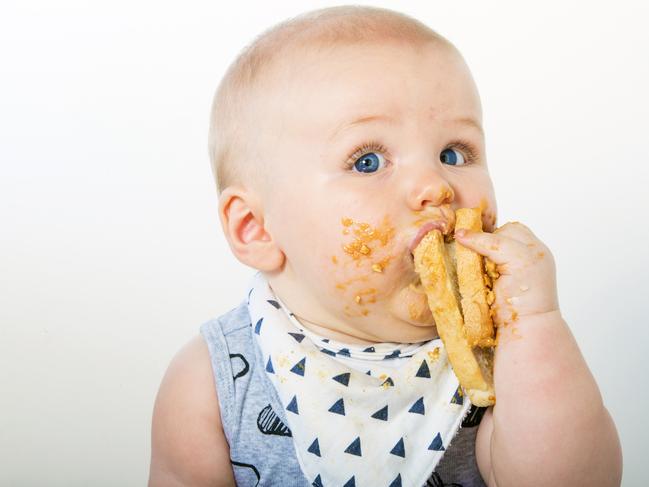Medical experts suggest egg and peanuts in babies’ diets to prevent food allergies
Immunology experts are defying popular convention and changing guidelines to say parents should introduce two particular foods to their baby’s diet in their first year of life to prevent food allergies, even if they are deemed to be high risk.

QLD News
Don't miss out on the headlines from QLD News. Followed categories will be added to My News.
ALL babies should have egg and peanuts introduced to their diets in their first year of life to prevent food allergies, even if they are deemed to be high risk, experts say.
Guidelines developed by the Australasian Society of Clinical Immunology and Allergy recommend that parents should start feeding solid foods to babies at around six months of age, preferably while they continue to breastfeed.
The society suggests egg and peanuts should be introduced by 12 months but not before four months.
Once the foods are introduced, the guidelines recommend they should be continued twice weekly in the baby’s diet so that tolerance is not lost.
“Hydrolysed” infant formula – designed to be hypo-allergenic – is no longer recommended for the prevention of allergies.
The recommendations are outlined in the latest Medical Journal of Australia, published today.
Lead author Preeti Joshi, based at The Children’s Hospital at Westmead, in Sydney, said food allergy rates in Australia were among the highest in the world.
Melbourne research has shown that about one in 10 babies have a proven food allergy before their first birthday. Food allergies involving egg, cow’s milk, wheat, soy, peanuts, tree nuts, fish and shellfish are the most common in Australia.

Previous infant feeding guidelines have recommended that certain allergenic foods be avoided in early childhood.
But writing in the Medical Journal of Australia, Dr Joshi said “moderate evidence” was emerging that regular peanut intake before 12 months of age could reduce the risk of children developing peanut allergy.
She said if parents were concerned about introducing peanuts to their children, particularly if they already had severe eczema or an egg allergy, they should discuss this with a doctor.
“We acknowledge that there is a cultural fear of peanut introduction,” Dr Joshi wrote. “This does need to be balanced by a practical approach whereby infants have access to introduction of peanut in a timely fashion.
“It is somewhat reassuring that there have been no reports of fatalities to peanut under 12 months of age anywhere in the world, even in countries that have practised early introduction of peanut, for example Israel, for many years.”
The guidelines stress that if a child has an allergic reaction to peanuts at any stage, parents should seek medical advice.

Dominique Thatcher, of Yandina, in the Sunshine Coast hinterland, started feeding her six-month-old son Lawson peanut paste about a month ago.
“It seems to be working fine,” she said.
Suggested procedures for peanut introduction to babies under 12 months:
•Rub a small amount of smooth peanut paste on the inside of the baby’s lip.
•If there’s no allergic reaction after a few minutes, feed the baby a quarter of a teaspoon of the peanut paste as a spread or mixed into other food and observe them for half an hour.
•Give them another half teaspoon and observe them for another 30 minutes if there’s still no allergic reaction.
•Parents should continue to include peanut in their baby’s diet in gradually increasing amounts at least weekly.
•They should stop feeding peanut to the infant if an allergic reaction is observed at any stage and seek medical advice.


